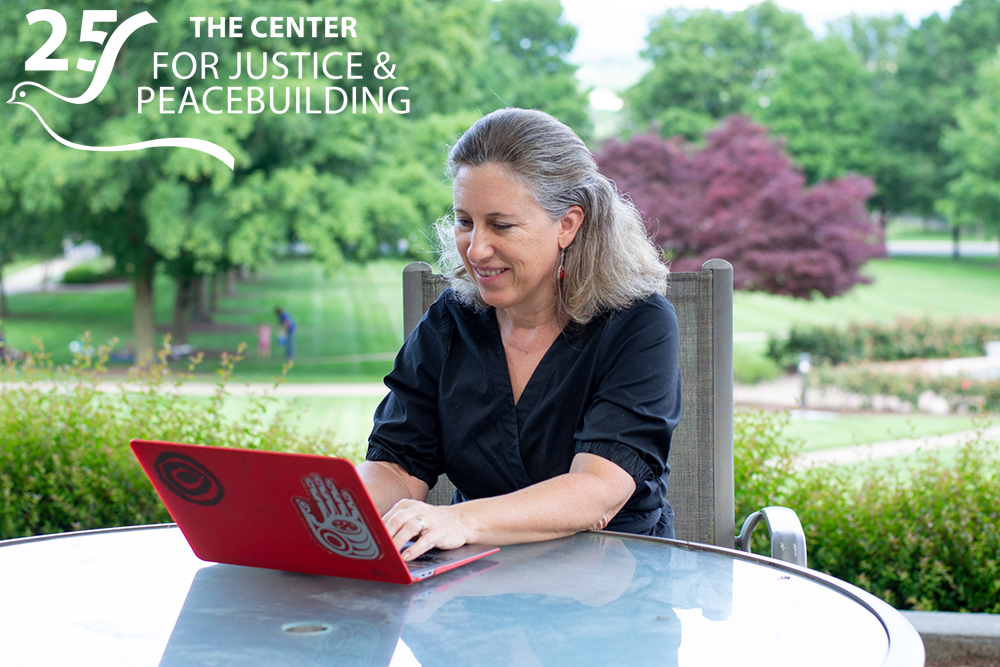If two people walk up to the same bench in a park, they’re generally going to be nice to each other. They’ll allow one another the room to sit down; it’s unlikely anyone will start shouting.
But on Facebook …
It’s a different story online: it’s easier to become upset, to deny someone the benefit of the doubt, to say things we might not say to someone’s face. But what’s the psychology behind that? Who profits from our cyber-outrage? And how powerful is social media in fueling hatred, not only online, but on the ground? These were some of the questions that Instructor Lisa Schirch and about 30 remote participants delved into during a recent five-week course “Digital Peacebuilding and Peace Tech.” The course was one of 11 offered online during the 2020 Summer Peacebuilding Institute at Eastern Mennonite University.
Schirch’s students tuned in from all over the world, whether it was 11 a.m. in Richmond, Va., at the start of class, or 10 p.m. in Bangkok, Thailand. They came representing the Center for Community Justice in Elkhart, Indiana; the United Nations Development Programme (UNDP) in several countries in South Asia, and the United Way of Franklin County, Pennsylvania, to name a few.
While the participants studied policy briefs and social media initiatives from a variety of countries on digital terrorism and peacebuilding, there was a lot to discuss about America during the class.
“Social media is playing a critical role in both the pandemic and the national protests supporting racial justice,” said Schirch. “The cell phone video of the killing of George Floyd is an example of how new technologies can empower individuals to document injustices in their lives … But on the other hand, social media has been used to spread disinformation about COVID-19 and the protests.”
Schirch works with the Toda Peace Institute, which promotes peace and justice through policy-oriented research and practice. She researches and writes on a variety of issues, including how new technologies impact global conflict and violence, how peacebuilders can use those technologies, and what policies governments and companies can use to address the challenges and harness the opportunities of these technologies.
Mennonite pastor Erica Lea-Simka joined from Albuquerque, New Mexico. She took the class to “continue to move into Jesus’ call to be a peacemaker, or peacebuilder, in these fraught digital times.”
“I have already begun compiling highlights from the course into a presentation for my congregation so they too can be more aware of online challenges and opportunities related to extremism and peace,” Lea-Simka said.
She added that being able to attend SPI online allowed her to balance the class with her regular pastoral responsibilities, as well as saving on travel expenses.
Schirch said “teaching online was really wonderful – and challenging.” Besides using Zoom for class sessions, guest speakers, and individual video conferences, she relied on programs like Panopto and VoiceThread to share pre-recorded lectures and have participants interact via short video clips.
“It is not the same as teaching in person – there are definitely human interactions that cannot happen online. But I was amazed that we could function as well as we did in our online classroom,” said Schirch.
Hamza Hasan is a senior social inclusion officer in UNDP Pakistan’s Youth Empowerment Programme, which is now implementing digital peacebuilding and inclusion interventions in their work. Hasan joined the class from Islamabad, Pakistan for the “excellent theoretical underpinning” it provided to his work understanding hate speech issues on social media and promoting responsible public health behavior during the pandemic.
“This helps place my ongoing work within the larger global efforts to promote digital peace building, and offers opportunities to adopt lessons learned from the implementation of similar interventions in varying contexts,” Hasan said.
After five weeks of classes, video upon video on topics such as Facebook’s profit model and Moscow-based misinformation, edifying talks with guest lecturers like award-winning journalists and depolarization innovators, and small group sessions on the power of hashtags; the digital peacebuilders waved goodbye one last time through their webcams. The Zoom doorbell rang as each one left the meeting, off to build peace in their separate spheres on the internet frontier.

Reading about “Digital Peacebuilding and Peace Tech” makes me wish I had signed up for the course. I find Facebook helpful in staying connected with people from near and far, but I am disturbed by the “cyber outrage” and the unhealthy way FB users express uncontrolled emotions and anger. Will any of the content from the course be available in print or online? What resources can you recommend for use in small groups in a congregation?
Although I graduated in the class of 1963, I am still learning how to live peacefully in a divided and hurting world.
Hello Verna. We are hoping to offer that course again at SPI 2021, hopefully in person. Please send me your email address (send to william.goldberg@emu.edu) and I will let you know when we have our schedule set.
Bill Goldberg
Director, Summer Peacebuilding Institute